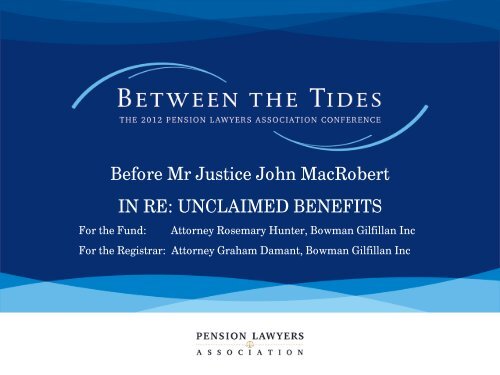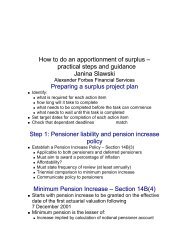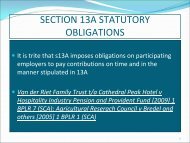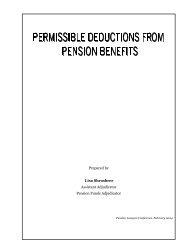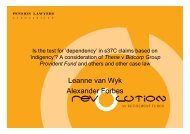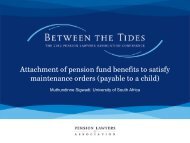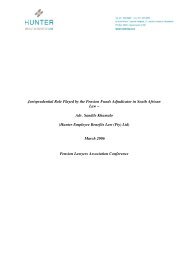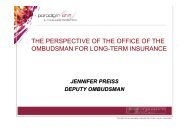Download PDF
Download PDF
Download PDF
You also want an ePaper? Increase the reach of your titles
YUMPU automatically turns print PDFs into web optimized ePapers that Google loves.
Before Mr Justice John MacRobert<br />
IN RE: UNCLAIMED BENEFITS<br />
For the Fund: Attorney Rosemary Hunter, Bowman Gilfillan Inc<br />
For the Registrar: Attorney Graham Damant, Bowman Gilfillan Inc
Application for rule amendment<br />
• To provide for the establishment of an account in the books of<br />
the fund in which provision will be made for liabilities falling<br />
within the scope of the definition of ‘unclaimed benefits’ in the<br />
PFA;<br />
• To allow the amount to be credited to that account to be<br />
determined from time to time by the fund’s valuator taking into<br />
account the likelihood that the amounts will be claimed;
Application for rule amendment<br />
• To provide that, when the fund is placed in liquidation, the<br />
liquidator must –<br />
– Call for submission of claims to unclaimed benefits by a specified date;<br />
– Make provision in the fund’s preliminary liquidation and distribution<br />
accounts for amounts payable to only those who claim their ‘unclaimed<br />
benefits’ by that date;<br />
– Treat the balance of the provision for the ‘unclaimed benefits’ as<br />
‘surplus to be either –<br />
• Shared amongst stakeholders on a basis decided by the liquidator;<br />
or<br />
• Allocated to the employer surplus account.
Registrar refused to approve the rule<br />
amendment!<br />
“I reject the rule amendment because, in my opinion,<br />
it is inconsistent with the PFA (and, if not with the<br />
PFA, with the spirit of the law!)”<br />
Picture by Robbie Tshabalala
Fund’s argument<br />
• Regulatory history<br />
– Nothing in PFA, regulations or circulars prohibits rule<br />
amendment<br />
• Rule amendment is not inconsistent with<br />
– The Pension Funds Act<br />
– The 1973 Companies Act<br />
– The Administration of Estates Act
Regulation 30(2)(r)<br />
• The rules of a fund must provide for -<br />
‘the manner in which unclaimed benefits shall be dealt with upon—<br />
(i) the death of a member (including any deferred pensioner);<br />
(ii)the liquidation of the pension fund; and<br />
(iii)the withdrawal of a member from the pension fund’<br />
• But it doesn’t say what in what manner the rules must say<br />
they must be treated.
Section 15B of the PFA (‘the surplus<br />
legislation)<br />
• Provision had to be made for the ‘minimum benefit top-ups’<br />
for former members for whom those top-ups could be<br />
calculated, even if they could not be traced.
Regulation 35(4) promulgated in 2003<br />
“Where a board is able to determine the enhancement due in respect<br />
of a particular former member … but is unable to trace that former<br />
member … the board shall put the corresponding enhancement into a<br />
contingency reserve account specific for the purpose. Notwithstanding<br />
anything in the rules of the fund, moneys may not be released from<br />
such contingency reserve accounts except as a result of payment to<br />
such former members or as a result of crediting the Guardians fund or<br />
some other fund established by law to include such amounts.’
Problems with regulation 35(4)<br />
• There is no ‘fund established by law’ to hold provisions for<br />
unclaimed benefits;<br />
• The Guardians Fund was established in terms of the Administration<br />
of Estates Act to hold assets belonging to the estates of individuals,<br />
not assets held by retirement funds;<br />
• You can only pay to the Guardians Fund an amount which is not<br />
your property and which has been unclaimed by the owner for 5<br />
years or more, and an amount held by a fund as a provision for a<br />
liability is not an amount which is not the property of the fund;<br />
• Its enactment was ultra vires the powers of the Minister because –<br />
– It was inconsistent with the PFA; and<br />
– It was irrational.
Problems with regulation 35(4)<br />
• It was inconsistent with the PFA because-<br />
– It obliged a fund to establish and CRA for unclaimed benefits when the<br />
defn of CRA makes it clear that the establishment of such an account is<br />
a matter for the board to decide;<br />
– It obliged the fund to hold 100% of the face value of ‘unclaimed<br />
benefits’ when the defn of CRA says that the amount to be credited to a<br />
CRA is a matter for the valuator to decide.<br />
• It was irrational because –<br />
– It required a fund to freeze assets rather than use them to fulfill the<br />
objects of the fund, even when some of the claims to ‘unclaimed<br />
benefits’ will have prescribed.
Circular PF 126 issued in November 2007<br />
‘Any registered rule of a fund which allows for an unclaimed benefit to<br />
revert back to a fund may no longer be implemented. Such a reversion<br />
of benefits detrimentally affects the rights of a member whose benefit<br />
remains unclaimed. In the case of a liquidation or a full transfer,<br />
followed by deregistration, the member will be unable to claim.<br />
Any such benefits must remain in the fund until the member has been<br />
traced.<br />
Funds are required to amend their rules, on or before 31 December<br />
2008, to remove any reference to benefits reverting back to the fund.’<br />
But PF Circulars are not law and are thus unenforceable.
Definition of ‘unclaimed benefit’ inserted in<br />
PFA in 2008<br />
• Unclaimed benefit means -<br />
(a) A [non-pension] benefit payable in terms of the rules but not paid<br />
within 24 months or by liquidation date;<br />
(b) An pension payable in terms of the rules but which has not been paid<br />
within 24 months or liquidation date; or<br />
(c) Share of surplus payable to former member in terms of surplus<br />
apportionment scheme but not paid within 12 months after approval<br />
of scheme.<br />
• It excludes -<br />
– Transfer values to be paid in terms of section 14 or on purchase of<br />
an annuity; or<br />
– Death benefit payable but not paid within 24 months.
Establishment of ‘special purpose preservation<br />
funds’ to hold unclaimed benefits<br />
• Only purpose of definition of ‘unclaimed benefit’ in PFA<br />
seems to have been to allow for establishment of these funds<br />
and their approval for income tax purposes.<br />
• Nothing in PFA allows or permits a fund to off-load to an<br />
unclaimed benefits fund a liability that has accrued to a<br />
creditor without the creditor’s consent.
Problems with paying unclaimed benefits to<br />
unclaimed benefits funds<br />
• It does not discharge the fund’s liability to the creditor;<br />
– Even if rule amendment to provide that it will, that amendment cannot<br />
apply to liabilities accrued before then.<br />
• Payment to unclaimed benefits fund will have been unlawful<br />
unless subject to a ‘call’ if beneficiary claims from the fund.<br />
• Payment is inconsistent with board’s duty to use the fund’s<br />
assets to meet its objects<br />
– Unclaimed benefits fund no more likely to locate beneficiaries than<br />
principal fund is;<br />
– No incentive for such funds to find them.
Ongoing fund should be allowed to manage its<br />
liability for unclaimed benefits like any other<br />
• Fund should continue to try to trace those entitled to the<br />
unclaimed benefits;<br />
• Valuators should determine the amounts to be held as<br />
provisions for those unclaimed benefits taking into account<br />
likelihood that the beneficiaries will be traced (i.e. not 100% of<br />
face value);<br />
This does not mean that liabilities are reduced – only that the<br />
amount held as provision for them is reduced.<br />
• Excess provision can be used for other purposes.
Fund in liquidation should be allowed to deal<br />
with its liabilities as a company would<br />
• When a company is wound up, liquidator calls for submission<br />
of claims.<br />
• Only claims submitted by a specified date are taken into<br />
account in the preliminary liquidation and distribution account.<br />
• In the case of a pension fund, amounts capable of payment to<br />
traced beneficiaries should also be.<br />
• Balance of fund’s provision for unclaimed benefits should be<br />
treated as other surplus is treated on liquidation.
Rule amendment is not inconsistent with the<br />
PFA<br />
• Section 28(4): “All claims against the fund shall be proved to<br />
the satisfaction of the liquidator.”<br />
• It is not inconsistent with provisions of old Companies Act<br />
incorporated by reference into the PFA;<br />
– There will be no ‘unpaid dividends’ to be paid to the Guardian’s Fund;<br />
• It is not inconsistent with the Administration of Estates Act<br />
which says that a person holding an amount that is not his or<br />
her property and which has been unclaimed for 5 years or<br />
more must pay it to the Guardian’s Fund. But a claimant’s<br />
claim to an ‘unclaimed benefit’ is his or her only property.
And please don’t tell me the rule is<br />
inconsistent with ‘the spirit of the law’!<br />
• Dadoo Ltd & others v Krugersdorp Municipal Council 1920<br />
AD 530 said:<br />
– The purpose of the law may be an aid to the interpretation of unclear<br />
legislation but if the wording is clear, the purpose is irrelevant.<br />
– A statute does not operate beyond its wording.<br />
• Standard Bank Investment Corporation v Competition<br />
Commission 2000(2) SA 797 (SCA)<br />
– Parliament legislates in words, not in spirit.<br />
– The policy behind the legislation is not a substantive element of the<br />
law.
Registrar’s argument


